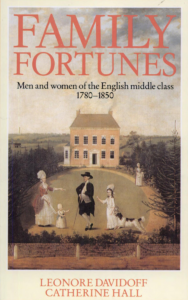Historiography of Protest & Gender: Press Releases
Sellman – Davidoff and Hall, Family Fortunes
The Lasting Legacy of Family Fortunes

Historiography Connections
Birmingham, England; Counties of Suffolk and Essex, England
Geographic Coverage
Citation for First Edition/Printing
Press Release
Leonore Davidoff was a historian of sociology, specializing in social history, gender studies, and women’s history. Her MA from the London School of Economics included “a substantial 300 page dissertation” called “The Employment of Married Women,” which was a topic never researched before then. Davidoff became a Senior Fellow of Lucy Cavendish College and published numerous articles and a book, which were all highly influential in the newly emerging field of gender history. In 1987 she and Catherine Hall published Family Fortunes: Men and Women of the English Middle Class 1780-1850.[1]
Catherine Hall began her education at the University of Sussex and completed it at the University of Birmingham, where she wrote Family Fortunes with Davidoff. Her specializations are gender history, colonialism, and British history. She is currently emerita professor of British social and cultural history and chair of the Centre for the Study of the Legacies of British Slavery at University College London.[2]
Content
Family Fortunes explores the development of England’s middle-class from 1780-1850 by focusing on two distinct areas: the urban city of Birmingham and the rural counties of Essex and Suffolk. Called “the most influential work in British gender history,” it was groundbreaking by arguing that women had an essential contribution to family businesses and the development of England’s capitalist economy.[3] Another important argument is the concept of “separate spheres,” wherein the public sphere is inhabited by men and the private sphere by women, an idea which was a key part of middle-class identity.[4]
Methods
Davidoff and Hall divided their book into three sections: “Religion and Ideology,” “Economic Structure and Opportunity,” and “Everyday Life: Gender in Action.”[5] Within these sections, the authors explore numerous topics by using two case studies, the industrial city of Birmingham and the rural counties of Suffolk and Essex. As Davidoff and Hall write, Family Fortunes “argues for the centrality of the sexual division of labour within families for the development of capitalist enterprise.”[6] They support this argument by examining families, both the smaller unit of parents and children and the wider kinship ties that formed communities. To do so, they “attempted to reconstitute the world as provincial middle-class people saw it, experienced it and made sense of it” with the goal of showcasing how important gender was, at a time when the field of gender history was just beginning.[7]
Critiques
Because Family Fortunes was published early in the development of gender and women’s history as accepted fields of study, more recent research has shown some of its claims to be partially or fully incorrect. For example, it has since been found that the “seemingly stark legal sanctions against female property-holding were modified, subverted and manipulated in practice.”[8] The book neglected to include the impacts of politics on the middle-class, overstated the differences between the middle and upper classes, and perhaps failed to fully recognize the development of the middle-class prior to the year 1780.[9]
Impact on Historiography
The impact of Family Fortunes: Men and Women of the English Midde Class 1780-1850 on the study of women’s and gender history can scarcely be overstated. It inspired and continues to inspire important scholarship, as “the consequence of a study which pushed…upon the boundaries of and possibilities of gender history in 1987.”[10]
[1] Gleadle, 779.
[2] Gleadle, 776-777.
[3] Davidoff, Leonore, and Catherine Hall. 1987. Family Fortunes: Men and Women of the English Middle Class 1780-1850. Chicago: The University of Chicago Press, 6-7.
[4] Davidoff and Hall, 13.
[5] Davidoff and Hall, 28-29.
[6] Gleadle, Kathryn. “Revisiting Family Fortunes: Reflections on the Twentieth Anniversary of the Publication of L. Davidoff & C. Hall (1987) Family Fortunes: Men and Women of the English Middle Class, 1780-1850.” Women’s History Review 16, no. 5 (2007): 773-782. https://doi.org/10.1080/09612020701447848, 773.
[7] Twells, Alison. “Book Reviews.” Gender and History 15, no. 2 (2003): 371-390. https://doi.org/10.1111/1468-0424.00309, 386-387.
[8] Glucksmann, Miriam. “Leonore Davidoff 1932 -2014.” University of Essex. University of Essex, October 2014. https://www1.essex.ac.uk/news/event.aspx?e_id=6991.
[9] McKie, Anna. “Interview with Catherine Hall.” Times Higher Education. Times Higher Education, October 4, 2021. https://www.timeshighereducation.com/unijobs/article/interview-with-catherine-hall.
